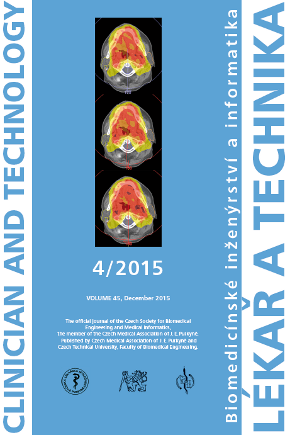EFFECT OF LINEAR ACCELERATOR SETTINGS ON EVALUATION OF DOSIMETRIC VERIFICATION OF VMAT PLANS
Klíčová slova:
volumetric modulated arc therapy (VMAT), Octavius QA system, gamma analysisAbstrakt
Background and purpose: Comparison of the measured and the calculated 2D dose distributions in the planning system is one of the standard methods of VMAT (volumetric-modulated arc therapy) plans verification in radiotherapy. The aim of this paper is to assess the ability of the QA (quality assurance) method used at the University Hospital Olomouc to detect significant errors in the linear accelerator settings and to estimate clinical impact of the undetected changes. Materials and methods: To study this issue we chose a method based on introducing simulated errors in gantry and MLC (multi-leaf collimator) settings into 10 clinical VMAT plans of the prostate and the head and neck patients. The ability of the verification system to recognize changes in prescribed setting is - for the purpose of this paper - characterized by a maximum error, in which the two dose distributions are evaluated as sufficiently identical within the parameters of gamma analysis. VMAT plans with the maximum undetected error were recalculated back into the real patient anatomy in order to assess the potential clinical impact. Results: The verification method including 3%/3mm gamma analysis criteria together with Octavius II system is able to detect errors larger than 2mm in MLC and 3° in gantry settings in the head and neck VMAT plans and 3mm and 5° for prostate VMATs. In comparison with the original plan, dose recalculations with these errors in the settings back into the real patients showed differences in dose distributions. Conclusion: Comparison of dose volume histograms for the original plan and the plans recalculated with implemented errors indicate that this system of verification of VMAT plans could cover up clinically relevant errors.Stažení
Publikováno
Číslo
Sekce
Licence
Copyright (c) 2017 Václav Novák, Ivo Přidal, David Gremlica

Tato práce je licencována pod Mezinárodní licencí Creative Commons Attribution 4.0 .
Authors who publish with this journal agree to the following terms:
- Authors retain copyright and grant the journal right of the first publication with the work simultaneously licensed under a Creative Commons Attribution License (https://creativecommons.org/licenses/by/4.0/) that allows others to share the work with an acknowledgment of the work's authorship and initial publication in CTJ.
- Authors are able to enter into separate, additional contractual arrangements for the non-exclusive distribution of the journal’s published version of the work (e.g., post it to an institutional repository or publish it in a book), with an acknowledgment of its initial publication in this journal.
- Authors are permitted and encouraged to post their work online (e.g., in institutional repositories or on their website or ResearchGate) prior to and during the submission process, as it can lead to productive exchanges.
CTJ requires that all of the content of the manuscript has been created by its respective authors or that permission to use a copyrighted material has been obtained by the authors before submitting the manuscript to CTJ. CTJ requires that authors have not used any copyrighted material illegally, as for example a picture from another journal or book, a photo, etc. It is the author’s responsibility to use only materials not violating the copyright law. When in doubt, CTJ may ask the authors to supply the pertinent permission or agreement about the use of a copyrighted material.
The opinions expressed in CTJ articles are those of authors and do not necessarily reflect the views of the publishers or the Czech Society for Biomedical Engineering and Medical Informatics.


